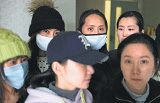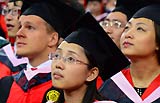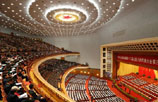Global spotlight on Chengdu
By Huang Zhiling, Li Yu and Liu Baijia (China Daily) Updated: 2014-07-21 14:52A visit by US First Lady Michelle Obama has reignited interest in the historic and scenic city, Huang Zhiling and Li Yu in Chengdu and Liu Baijia in Beijijng report. In early April, Wan Yongqing, a young man from Beijing, went to Chengdu, the capital of Southwest China’s Sichuan province, especially to see pandas and taste hot pot.
"I chose the city as the destination of my annual holiday because Michelle Obama visited Chengdu, which I had admired for quite a long time but had not visited before. As a matter of fact, Obama’s visit prompted my visit," says Wan, a keen traveler who likes to explore and has visited cities around the world.
US First Lady Michelle Obama, her daughters and her mother spent two days in Chengdu during her seven-day trip of China in March.
Their visit reignited people's interest in the city, which is renowned for its fine food and pandas.
"Since Obama, her mother and daughters dined in the Damiao Hot Pot Restaurant in late March, the number of diners has more than doubled. Many of them are from outside Sichuan who are curious to see what the first lady and her family ate in our restaurant," says Luo Li, a waiter who served the Obama family at the restaurant in the Kuan Zhai Alley in downtown Chengdu.
Chengdu is home to various kinds of delicious foods. Diners can devour Western dishes in the stylish Shangri-La Hotel, where the Obama family stayed, and tuck into delicious Sichuan food in many restaurants around town.
Sichuan food, one of China's four best-known types of cuisine, boasts more than 6,000 dishes and attracts food lovers from around the world.
James Ayala has worked at the Chengdu Research Base of Giant Panda Breeding for nearly two years. His contract is due to expire this month but the 39-year-old American animal trainer says he wants to stay in Chengdu as long as possible.
"One reason is that I love pandas. The other is that I like the Sichuan food," he told China Daily.
Ayala, who is the base's only full-time foreign employee, likes the spicy tofu in a well-known restaurant near his house in downtown Chengdu. "Each week, I visit the Chen Mapo Tofu Restaurant at least once," he says.
On the final day of their seven-day tour of China, the Obama family was awestruck by the pandas at the base.
Obama and her daughters, Malia and Sasha, and Obama's mother, Marian Robinson, spent more than an hour at the base, which is in the northern suburbs of Chengdu. They gave a collective "wow" as they watched a family of pandas eat bamboo.
Li Li, a 22-year-old female panda, was in an enclosure with her five cubs. Blissfully unaware of their distinguished guests, the panda family continued to crack and chew bamboo.
Obama and her daughters were quiet as they observed the cubs and then base chief Zhang Zhihe joined them to explain the pandas' daily habits.
Robinson, wearing plastic gloves, held out a long bamboo stalk that had a slice of apple at the end of it as the first lady stood attentively behind her.
"The base is a must for first-time foreign visitors to Sichuan. There are more foreigners in the base than in the rest of Chengdu," Ayala says.
The base was set up on Futou Hill in March 1987 with six sick and hungry pandas saved from the wild.
Base chief Zhang Zhihe said thanks to the joint efforts of several generations of researchers, the 66-hectare scenic base with dense bamboo forests and a lake, solved the main difficulties with panda breeding. Today it has 118 pandas under its care.
"It was difficult for pandas to be amorous, it was difficult for them to get pregnant, and it was difficult for the cubs to survive. These were the three difficulties in panda breeding," Zhang said.
Obama flew back to Washington on the afternoon of March 26, after visiting the Chengdu Research Base of Giant Panda Breeding. She called Chengdu a "beautiful city" and said she would not mind living in China.
Chengdu was named the Best Tourism City of China by the National Tourism Administration and the World Tourism Organization and boasts several scenic spots and areas of historical importance.
One of these is the Kuan Zhai Alley area where Obama and her family visited before enjoying a hot pot meal.
The area is formed by three alleys called Kuan Alley (Wide Alley), Zhai Alley (Narrow Alley), and Jing Alley (Well Alley).
The area, which was renovated between 2005 and 2008, consists of courtyards and gardens in the architectural styles of the Ming (1368-1644) and Qing (1644-1911) dynasties.
"I have learned from many guidebooks that Chengdu is a city whose site and name have not changed for 3,000 years. I found the guidebooks' description of the city apt when I visited the Kuan Zhai Alley, for it reminded me of the good old days," said Wang Shisha, an 83-year-old tourist from Daye county in Central China's Hubei province.
To executives of multinational companies, Chengdu has more to offer than fine food, pandas and tourist attractions.
The city is home to more than 200 of the Fortune Global 500 companies and Chengdu's foreign capital is the highest among cities in western China.
The Shuangliu International Airport is one of the best equipped in China, making Chengdu the fourth-biggest air hub in the country, behind Beijing, Shanghai and Guangzhou.
Contact the writers at huangzhiling@chinadaily.com.cn
- Beijing-Tianjin-Hebei rolls out measures to tackle air pollution
- Prosecutors act to curb child abuse
- Shanghai mulls policies for more talent
- Construction on Nansha Islands 'befits China's intl obligations'
- Safety watchdog sends team to probe fatal fire in nursing home
- 175 grave robbers arrested in biggest-ever tomb raid
- China has no overseas military bases: Spokesperson
- Hero pilots died avoiding built-up area
- Canada to seize assets and extradite fugitives: Envoy
- At least 38 killed in nursing home fire in C China






